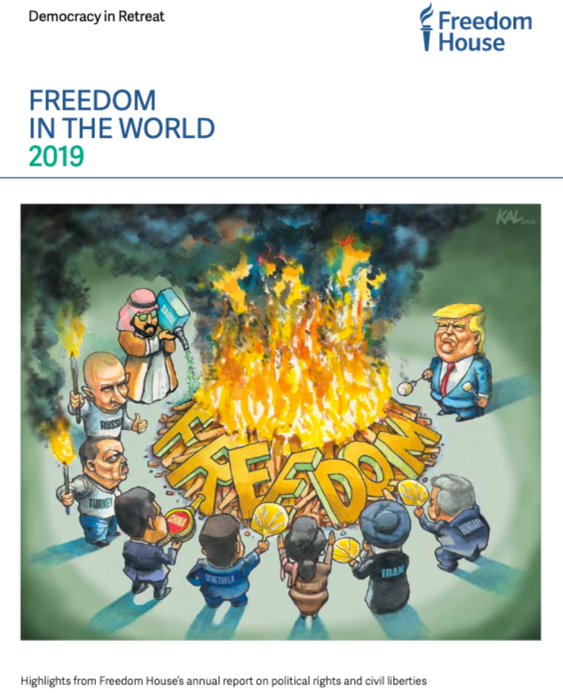New Report: Freedom House Releases “Freedom in the World 2019”
From Freedom House:
Challenges to American democracy are testing the stability of its constitutional system and threatening to undermine political rights and civil liberties worldwide, according to Freedom in the World 2019, the latest edition of the annual country-by-country assessment of fundamental freedoms, released today by Freedom House.
As part of this year’s report, Freedom House offered a special assessment of the state of democracy in the United States midway through the term of President Donald Trump. While democracy in America remains robust by global standards, it has weakened significantly over the past eight years, and the current president’s ongoing attacks on the rule of law, fact-based journalism, and other principles and norms of democracy threaten further decline.
Key Global Findings
- Of the 195 countries assessed, 86 (44 percent) were rated Free, 59 (30 percent) Partly Free, and 50 (26 percent) Not Free.
- The United States currently receives a score of 86 out of 100 points. While this places it below other major democracies such as France, Germany, and the United Kingdom, it is still firmly in the Free category.
- In 2018, the United States suffered a decline in the rule of law, as government policies and actions improperly restricted the legal rights of asylum seekers, discrimination became evident in the acceptance of refugees for resettlement, and immigration enforcement and detention policies were excessively harsh or haphazard.
- In contrast, conditions for freedom of assembly in the country improved, with an upsurge in civic action and no repetition of the previous year’s protest-related violence.
- Ethnic cleansing and related abuses are a growing trend, leading to a large jump over the past 13 years in the number of countries (3 to 11) that receive score reductions due to egregious efforts to alter the ethnic composition of their territory.
- In many struggling democracies, antiliberal leaders’ verbal attacks on the media contributed to broader declines in press freedom and growing physical threats against journalists. At the same time, rulers elsewhere have been emboldened to take far more aggressive action in response to critical coverage.
- A growing number of governments are reaching beyond their borders to target expatriates, exiles, and diasporas. Freedom House found 24 countries around the world—including heavyweights like Russia, China, Turkey, Iran, and Saudi Arabia—that have recently targeted political dissidents abroad with practices such as harassment, extradition requests, kidnapping, and even assassination. Saudi Arabia’s murder of journalist Jamal Khashoggi in Turkey put a spotlight on authoritarian regimes’ uninhibited cross-border pursuit of their perceived enemies.
- Although the countries with net declines in this report (68) again outnumber those with net gains (50), the gap between them is smaller than in the previous year, and in 2018 more countries earned large improvements (more than 5 points) than in 2017.
- In Angola, Armenia, Ethiopia, and Malaysia, politicians unexpectedly responded or were forced to respond to public demands for democratic change, serving as a reminder that people continue to strive for freedom, accountability, and dignity, even in countries where the odds of success seem insurmountable.
- Hungary dropped from Free to Partly Free due to sustained attacks on the country’s democratic institutions by Prime Minister Viktor Orbán’s Fidesz party, affecting the media, religious groups, academia, NGOs, the courts, and the private sector. However, the year ended with vigorous dissent from thousands of protesters who took to the streets to denounce Orbán’s abuses.
- Serbia also dropped from Free to Partly Free due to election irregularities, legal harassment and smear campaigns against independent journalists, and President Aleksandar Vučić’s de facto accumulation of extraconstitutional powers.
- Nicaragua fell from Partly Free to Not Free as authorities brutally repressed an antigovernment protest movement with arrests and imprisonment of opposition figures, intimidation and attacks against religious leaders, and violence by state forces and allied armed groups that resulted in hundreds of deaths.
Resources
About Gary Price
Gary Price (gprice@gmail.com) is a librarian, writer, consultant, and frequent conference speaker based in the Washington D.C. metro area. He earned his MLIS degree from Wayne State University in Detroit. Price has won several awards including the SLA Innovations in Technology Award and Alumnus of the Year from the Wayne St. University Library and Information Science Program. From 2006-2009 he was Director of Online Information Services at Ask.com.



